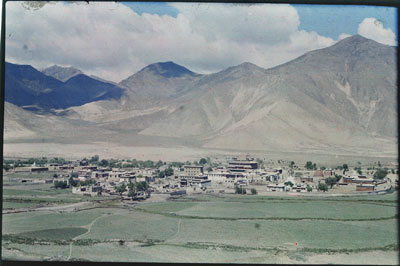
BMR.6.8.70 (Transparency colour)


BMR.6.8.70 (Transparency colour)

Hugh E. Richardson
Hugh Richardson
1949
Tsangpo Valley Region > Samye
BMR.6.8.70
60 x 90 mm
Transparency Colour
Hugh E. Richardson
Technical Information - The camera used to take this collection of colour slides (Dufay colour) were a Zeiss Super Ikonta and a Reflex Korelle. [KC 09/10/2006]
Manual Catalogues - Typewritten handlist entitled 'Hugh Richardson Collection, The British Museum. Photographs taken between 1936-50. Cameras: Zeiss Super Ikonta, Reflex Korelle. 300 colour slides (Dufay colour); copies made Jan. 1995.
[no.] 70. Samye Monastery.' [KC 10/10/2006]
Other Information - Background: Richardson visited Samye in 1949 and describes the site in High Peaks, Pure Earth , London, Serindia Publications, 1998, p. 315-6. "About twenty-six miles downstream [of Gong-dkar Rdzong] on the north bank [of the Tsangpo] is Bsam-yas (1949), "Beyond Imagining", the oldest, most famous, most beautiful and most numinous of Tibetan monasteries. Founded in 779 by Padmasambhava and the Indian pundit Santaraksita under the patronage of the King Khri Srong-lde-brtsan, it was conceived as the realization of an ideal universe in the form of a mandala. The spacious precinct is surrounded by a high wall representing the ocean, with a differently shaped temple at each of the cardinal points for continents and smaller island temples on either side. Some way inside the wall are four large mchod-rten , each in the colour appropriate to its geogaphical position - red at the south-west, black at the north-west, blue at the north-east, and white at the south-east. At the centre, enclosed in a high wall piercwed by doors on the east, south, north and west, stands, foursquare, the great dbu-rtse or gtsug-lag-khang , the symbol of Mount Me-ru, the centre of the universe. ..."
For Citation use:
The Tibet Album.
"Samye monastery"
05 Dec. 2006. The British Museum.
<http://tibet.prm.ox.ac.uk/photo_BMR.6.8.70.html>.
For more information about photographic usage or to order prints, please visit the The British Museum.
© The British Museum